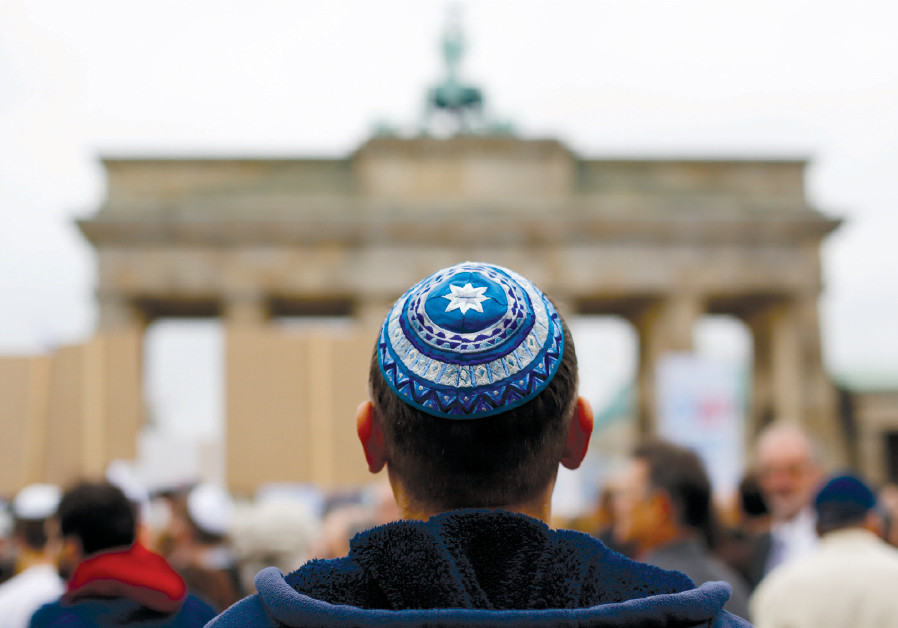Berlin Jewish community calls on residents to show solidarity in ‘Wear a Kippa’ rally

A MAN wearing a kippa waits for the start of a demonstration against antisemitism at Berlin’s Brandenburg Gate in 2014. (photo credit: THOMAS PETER/REUTERS)
Leaders of Berlin’s Jewish community have called on all residents of the German capital to wear a kippa and join them in a mass rally against antisemitism and intolerance on Wednesday.
The call for Berliners to show solidarity with the Jewish community at the ‘Berlin Wears A Kippa’ gathering follows a violent antisemitic street attack in the Prenzlauer Berg area of the city on April 17, during which two men wearing kippas were harassed by a man who struck them with a belt.
The perpetrator repeatedly shouted “Jew” in Arabic during the attack, which was filmed by one of the victims and shared on social media.
A German police spokeswoman said the suspected perpetrator of the attack was a 19-year-old Syrian citizen who turned himself in after being identified by investigators.
German Chancellor Angela Merkel condemned the incident, saying the nation must win the battle against antisemitism.
Germany’s Merkel says fight against antisemitism must be won, April 18, 2018 (Reuters)
“This is an absolutely terrible incident and we must act,” said Merkel. “The battle against such antisemitic incidents must be won. The reputation of our state is at stake, and we are committed to it with all our strength.”
In an unlikely development, a victim of the attack, Adam Armush, told German newspaper Deutsche Welle he was an Arab-Israeli residing in Berlin who wanted to prove to a friend that it would be safe to wear a kippa in the city.
Among those set to address the ‘kippa rally’ outside Berlin’s Jewish Community Center are Jewish community leaders, senior German politicians, including Governing Mayor of Berlin Michael Müller and President of the Berlin House of Representatives Ralf Wieland, and leaders of the city’s Christian community.
“I used to tell my Jewish friends and acquaintances not to wear a kippa to show their Jewish identity,” said Levi Solomon, spokesperson for the Jewish Forum for Democracy and Antisemitism, ahead of the rally.
“I have changed my mind. We must take this fight and become visible in public. Jews and non-Jews should now wear the kippa. We must not leave the public space to Islamists or far-Right antisemites.”
Nearly 100 groups and senior figures in German society have lent their support to Wednesday’s rally, including the Anne Frank Center, German Red Cross and German Institute for Human Rights.
A day ahead of the rally, however, one of German Jewry’s primary leaders warned community members to take precautions regarding public displays of Judaism in major cities.
Speaking to Berlin radio station Radio Eins, Josef Schuster, the head of Germany’s Central Council of Jews, said he favored wearing a kippa in principle but that it was advisable to wear “a baseball cap or something else to cover their head instead” in Germany’s major cities.
In an interview with Israeli television’s Channel 10 broadcast Sunday, Merkel said her government was doing “everything for the security” of Germany’s Jewish population.
“We are troubled by the fact that we have still not succeeded to entirely eradicate antisemitism,” said the German leader. “We have new phenomena, including refugees or those of Arab origin who bring with them a different type of antisemitism to Germany.”
“But unfortunately, antisemitism also existed before then,” she added. “It is troubling that there are no Jewish kindergartens, schools or synagogues without police protection.”
Merkel said her government had, for the first time in Germany’s history, appointed a commissioner charged with defeating antisemitism.
Responding to Merkel’s comments, the head of Germany’s Central Council of Muslims, Aiman Mazyek, emphasized Tuesday that most antisemitic offenses are “right-wing motivated” but that the organization “takes it very seriously that some refugees are hostile to Jews.”
“Antisemitism, racism and hatred are great sins in Islam, so we will never tolerate that,” Mazyek told the regional German newspaper Rheinische Post.
In recent decades, Germany has experienced a resurgence of Jewish life and is now home to more than 200,000 Jews.
According to a 2017 Bundestag report, more than 33,000 Israelis were granted German citizenship since 2000. Of those, nearly 32,000 kept their new citizenship and 1,599 renounced it.





Comments are closed.